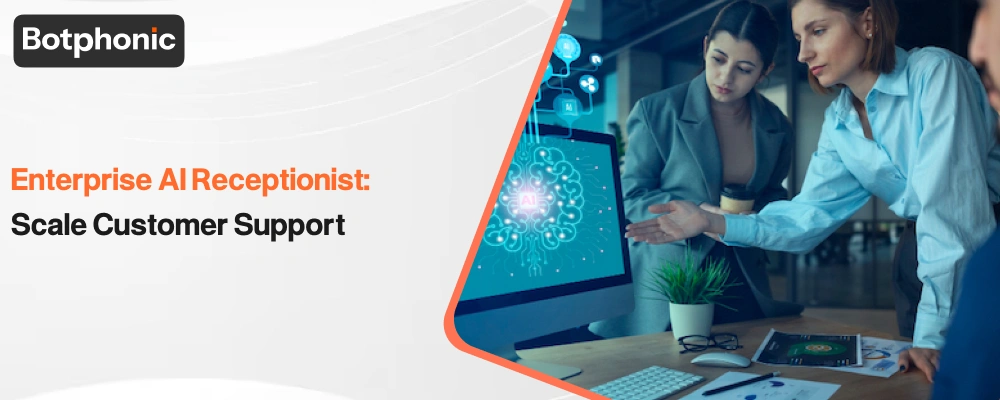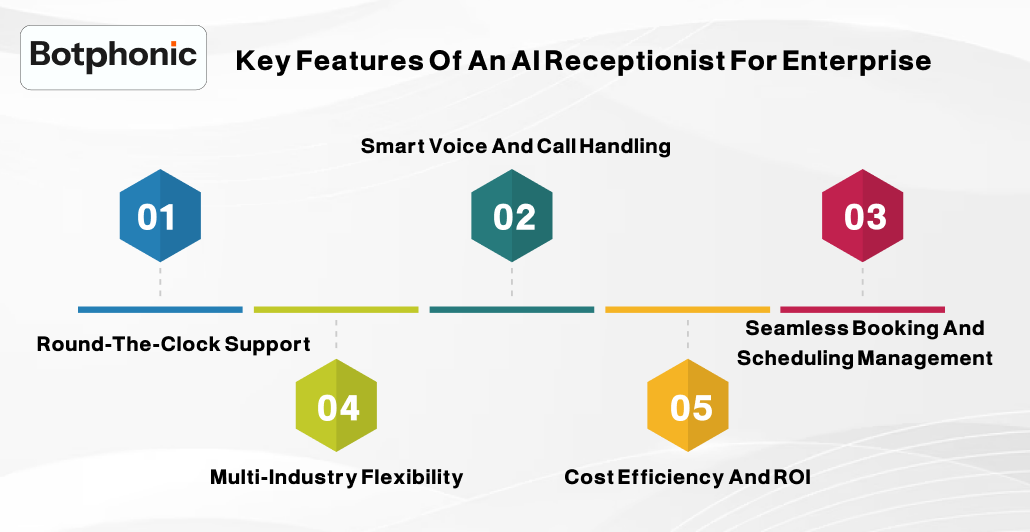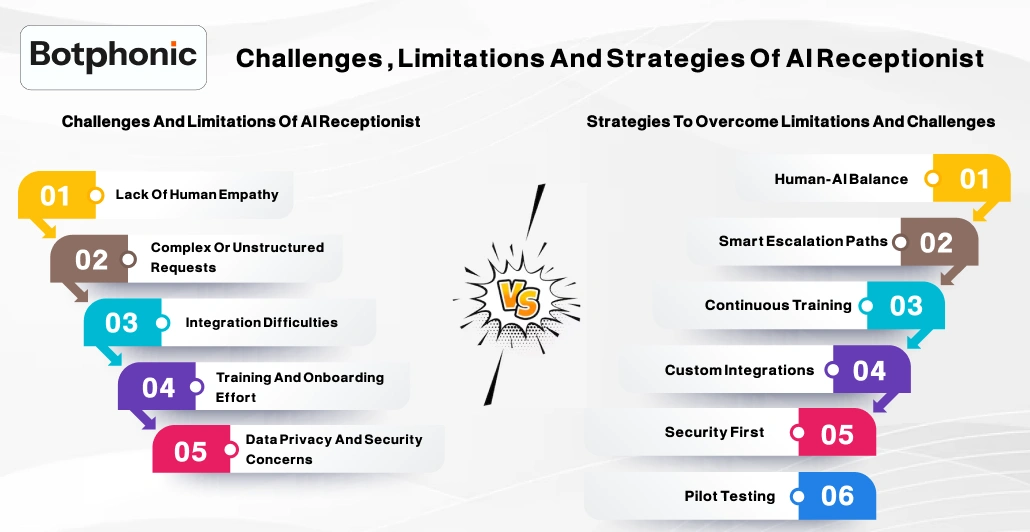
Summarize Content With:
Quick Summary
In this article, we’ll explore how an AI receptionist for enterprise is transforming customer interactions, the technology behind it, the human-AI collaboration, and also the challenges, limitations, and their solutions.
Introduction
Enterprises these days are facing one constant challenge, which is to deliver a scalable customer support without adding to any operational costs. Traditional reception desks and call centers used to often struggle to keep up with high call volumes, missed bookings, and 24/7 customer demands.
And to keep up with this demand, an AI receptionist for enterprise steps in and paves the way. This is more than just an automated answering system that combines with advanced voice recognition and natural language processing. Also, integrating with seamless booking management helps handle calls, messages, and inquiries around the clock. Having a voice AI receptionist that greets customers professionally to optimizing an AI-based virtual receptionist with round-the-clock support, enterprises are now adopting these intelligent systems to streamline operations and save costs.
What is an AI Receptionist for Enterprise?
An AI receptionist for an enterprise is referred to as a digital assistant that is powered by artificial intelligence. It manages the customer interactions through voice, chat, and phone systems, too. Unlike human receptionists, the system can handle unlimited calls and even inquiries at once, ensuring that no customers are left at waiting.
The main concepts of an AI receptionist, at its heart, are voice recognition, natural language processing, and even smart automation. They are actively leveraging smart automation to greet customers, answer common questions, and also help with call routing. By effectively managing bookings and schedules, they help provide reminders and integrate with tools such as CRM systems.
For example, a voice AI receptionist can easily pick up a customer’s call and understand their query. They will then proceed to resolve the query or will instantly connect them with the responsible human agent. Also, they ensure that enterprises never miss any important customer interactions, no matter the time of day.
Key Features of an AI Receptionist for Enterprise

An AI receptionist for enterprise is working beyond answering calls, but they are designed to deliver enterprise-level efficiency, cost-savings, and customer satisfaction, too. Let’s see some of the core features that make it requisite.
1. Round-the-Clock Support
Contrary to using old, traditional ways, an AI-based virtual receptionist with round-the-clock support ensures that customers are greeted whenever they call.
2. Smart Voice and Call Handling
With voice AI receptionist capabilities, enterprises are able to provide natural and human-like conversations. The system will serve as an AI virtual receptionist who answers FAQs, routes calls, and handles incoming inquiries.
3. Seamless Booking and Scheduling Management
One of the strongest AI receptionist capabilities for booking management is administering reservations, rescheduling, and sending reminders. Whether it’s a hotel, hair salon, or chiropractor’s office, the AI systems help ensure that there are smoother workflows.
4. Multi-Industry Flexibility
An enterprise AI receptionist can easily adapt to different sectors, such as an AI real estate agent receptionist for property inquiries, an AI receptionist for a hotel, which helps them with easier reservations. Moreover, top AI receptionist companies offer AI receptionist onboarding solutions that ensure compatibility with cloud communication tools.
5. Cost Efficiency and ROI
Having an AI receptionist cost-saving strategy has become one of the key decision drivers for enterprises. It helps them manage numerous tasks without having any additional human staff. Now, businesses can just rely on an AI-based virtual receptionist for round-the-clock support.
Human-AI Collaboration in Reception
An AI receptionist isn’t here to take jobs from humans, but they are designed to work with them. AI is made to handle tasks that are really time-consuming and repetitive; these tasks might overwhelm human staff. Let’s see how they both work together towards the firm’s growth:
- AI Handles Routine Tasks: The AI receptionist for an enterprise helps them manage calls, FAQs, and also aids in bookings.
- Human Focus on Complex Needs: Staff will work towards high-value and sensitive cases.
- Seamless Handoffs: The AI call assistant will collect details and escalate the call to a human when required.
- Continuous Training: With continuous updates, human staff ensure to refine the prompts and ensure that they stay accurate and on-brand.
- Customer Experience Boost: With AI systems integration, clients can get quick responses 24/7.
- Scalable and Cost-Efficient: Enterprises can save costs, even while handling thousands of interactions.
Challenges and Limitations of AI Receptionist
While there’s an AI receptionist for enterprise that delivers speed, cost savings, and scalability, it’s not like there aren’t any challenges between them. Handling sensitive conversations and even managing complex requests and data security are some of the challenges and limitations that are faced by businesses. However, if you can implement the right strategies, such as human-AI collaboration, seamless integrations, and even strong compliance measures, all these obstacles can be easily managed. Below, we will discuss some of the key challenges faced by enterprises along with their limitations and practical solutions.
1. Lack of Human Empathy: An AI receptionist is made to handle tasks efficiently, but they might struggle with emotional intelligence. A voice AI receptionist may sound natural and human-like, but it is not capable of mimicking human compassion.
2. Complex or Unstructured Requests: Even if you have implemented one of the best AI receptionists, they may struggle with unpredictable and multi-layered requests.
3. Integration Difficulties: Enterprises usually use multiple tools. But having a smooth integration with CRMs, booking apps, and other platforms can be tricky.
4. Training and Onboarding Effort: While AI receptionist onboarding is designed to be simple, the customization takes time. Staff should refine a few of the best AI voice receptionist prompts and monitor accuracy.
5. Data Privacy and Security Concerns: Managing customer calls refers to dealing with some sensitive information. If there are no strong safeguards, AI receptionist companies are risking compliance violations.

Strategies to Overcome Limitations and Challenges
- Human-AI Balance: Let your AI receptionist handle repetitive tasks and allow your human agents to focus on more important tasks.
- Smart Escalation Paths: Ensure to offer a quicker way for customers to reach a real human agent.
- Continuous Training: Update your AI voice prompts regularly, and ensure to manage your workflow based on real feedback.
- Custom Integrations: Opt for the solution that offers strong APIs to connect effortlessly with your CRMs and booking systems.
- Security First: Always make sure to implement encryption, role-based access, and compliance as a fundamental line.
- Pilot Testing: Don’t start with bigger and important projects; start small and ensure to monitor their performance.
Try Botphonic today and scale efficiently.
Try Now!!Conclusion
Enterprises are now transforming the way they operate. Incorporating AI receptionists has helped them offer 24/7 availability, cost-saving, and scalable support. It’s not limited to a single sector but is offering benefits across real estate, hotels, hair salons, and even the healthcare sector. Its core is integrated in NLP and voice AI, including cloud infrastructure with API integrations, which enables the smooth management of systems.
But only having AI is not the solution; having a human-AI balance is a necessity. AI will help them manage repetitive tasks, and humans can focus on important tasks. Although there are numerous challenges and limitations for AI receptionists, having the right strategy will help remove those limitations.

